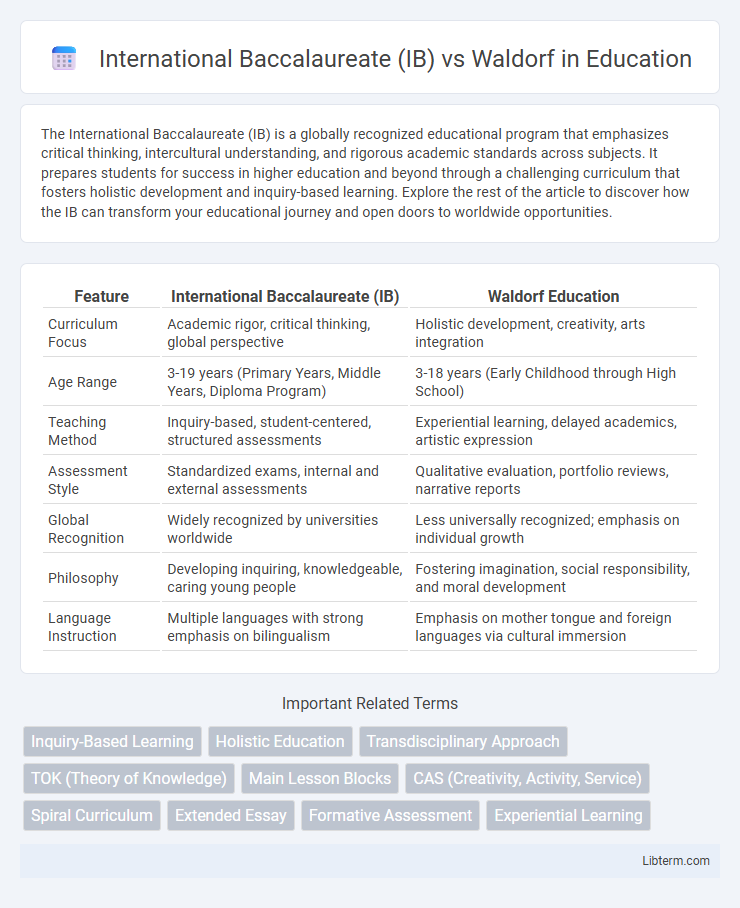The International Baccalaureate (IB) is a globally recognized educational program that emphasizes critical thinking, intercultural understanding, and rigorous academic standards across subjects. It prepares students for success in higher education and beyond through a challenging curriculum that fosters holistic development and inquiry-based learning. Explore the rest of the article to discover how the IB can transform your educational journey and open doors to worldwide opportunities.
Table of Comparison
| Feature | International Baccalaureate (IB) | Waldorf Education |
|---|---|---|
| Curriculum Focus | Academic rigor, critical thinking, global perspective | Holistic development, creativity, arts integration |
| Age Range | 3-19 years (Primary Years, Middle Years, Diploma Program) | 3-18 years (Early Childhood through High School) |
| Teaching Method | Inquiry-based, student-centered, structured assessments | Experiential learning, delayed academics, artistic expression |
| Assessment Style | Standardized exams, internal and external assessments | Qualitative evaluation, portfolio reviews, narrative reports |
| Global Recognition | Widely recognized by universities worldwide | Less universally recognized; emphasis on individual growth |
| Philosophy | Developing inquiring, knowledgeable, caring young people | Fostering imagination, social responsibility, and moral development |
| Language Instruction | Multiple languages with strong emphasis on bilingualism | Emphasis on mother tongue and foreign languages via cultural immersion |
Introduction to International Baccalaureate (IB) and Waldorf Education
International Baccalaureate (IB) offers a globally recognized curriculum emphasizing critical thinking, intercultural understanding, and rigorous academic standards across six subject groups. Waldorf Education, founded by Rudolf Steiner, focuses on holistic development through experiential learning, creativity, and integrating arts with academics based on developmental stages. Both approaches provide distinctive pedagogical frameworks, with IB prioritizing standardized assessment and global perspective, while Waldorf emphasizes individualized, arts-integrated education.
Philosophical Foundations of IB and Waldorf
The International Baccalaureate (IB) program is grounded in an inquiry-based learning philosophy emphasizing critical thinking, global-mindedness, and intercultural understanding to develop well-rounded, lifelong learners. Waldorf education is rooted in anthroposophy, prioritizing holistic development through creativity, imagination, and nurturing the intellectual, artistic, and practical skills harmoniously across childhood stages. Both philosophies aim to cultivate independent, ethical individuals, but IB focuses on academic rigor and global perspectives, whereas Waldorf stresses developmental stages and artistic expression.
Curriculum Structure and Content Comparison
The International Baccalaureate (IB) curriculum emphasizes a rigorous, globally recognized framework with defined subject groups, core components like the Extended Essay, Theory of Knowledge, and CAS (Creativity, Activity, Service) that foster critical thinking and international mindedness. In contrast, Waldorf education centers on a holistic, arts-integrated curriculum that progresses through developmental stages, emphasizing imaginative learning, artistic expression, and practical skills without standardized testing. While IB focuses on academic rigor and university preparation with interdisciplinary inquiry, Waldorf prioritizes nurturing creativity and social-emotional development through experiential, thematic lessons.
Teaching Methods: Inquiry vs. Imagination
The International Baccalaureate (IB) emphasizes inquiry-based learning, encouraging students to explore concepts through questioning, critical thinking, and real-world problem-solving, fostering analytical skills and global awareness. In contrast, the Waldorf education system prioritizes imagination-driven teaching, integrating artistic expression, storytelling, and hands-on activities to nurture creativity and holistic development. Both methods aim to cultivate independent learners, but IB's structured inquiry contrasts with Waldorf's emphasis on imaginative experience.
Assessment Approaches in IB and Waldorf Schools
The International Baccalaureate (IB) employs a rigorous, criterion-referenced assessment system emphasizing analytical skills, critical thinking, and interdisciplinary understanding, with both internal and external evaluations including written exams, oral presentations, and extended essays. Waldorf schools prioritize formative, qualitative assessment methods centered on holistic development and narrative reports, avoiding standardized tests to foster creativity, social skills, and emotional growth over quantitative grades. While IB assessments focus on measurable academic achievement and global standards, Waldorf assessments highlight individual progress and personal development through continuous teacher observations.
Role of Arts and Creativity
The International Baccalaureate (IB) integrates arts and creativity as essential components within a rigorous, inquiry-based curriculum that fosters critical thinking and global awareness. Waldorf education places a profound emphasis on artistic expression and imaginative play, using arts as a core method to develop emotional intelligence and holistic growth. While IB promotes a balanced inclusion of arts alongside academics, Waldorf centers creativity as the foundation for intellectual and personal development.
Emphasis on Global Citizenship and Cultural Awareness
The International Baccalaureate (IB) curriculum integrates a strong emphasis on global citizenship by fostering critical thinking, intercultural understanding, and multilingualism through its Learner Profile and transdisciplinary themes. Waldorf education cultivates cultural awareness by incorporating diverse artistic, musical, and storytelling traditions, encouraging empathy and respect for global cultures within a holistic, developmental framework. Both educational approaches prioritize fostering globally conscious individuals but employ distinct pedagogical methods to achieve cultural competency.
Student Development and Well-being
The International Baccalaureate (IB) emphasizes rigorous academic challenges and global-mindedness, fostering critical thinking and well-rounded intellectual growth, which enhances student resilience and adaptability. Waldorf education prioritizes holistic development through creativity, arts, and experiential learning, nurturing emotional intelligence and social skills for balanced well-being. Both approaches support student development but differ in focus: IB centers on academic rigor and global citizenship, while Waldorf advocates for imaginative learning and emotional growth.
Outcomes: Academic Achievement and Life Skills
International Baccalaureate (IB) programs emphasize rigorous academic achievement, fostering high critical thinking, research capabilities, and global awareness, resulting in strong university acceptance rates and career readiness. Waldorf education prioritizes holistic development, integrating artistic, social, and practical life skills to nurture creativity, emotional intelligence, and adaptability, often leading to well-rounded personal growth but less standardized academic outcomes. IB graduates typically demonstrate advanced academic qualifications, while Waldorf students excel in lifelong learning, collaboration, and hands-on problem-solving skills.
Choosing Between IB and Waldorf: Key Considerations
Choosing between International Baccalaureate (IB) and Waldorf education involves evaluating curriculum structure, teaching philosophy, and student goals. IB offers a rigorous, internationally recognized program emphasizing critical thinking, global awareness, and standardized assessment, ideal for students aiming for competitive universities. Waldorf education focuses on holistic development, creativity, and experiential learning, suiting families seeking a nurturing environment that prioritizes artistic expression and social-emotional growth.
International Baccalaureate (IB) Infographic

 libterm.com
libterm.com